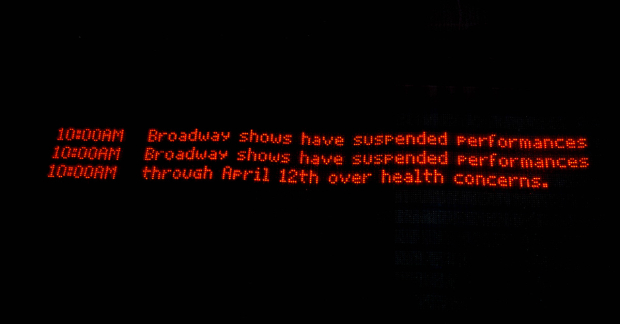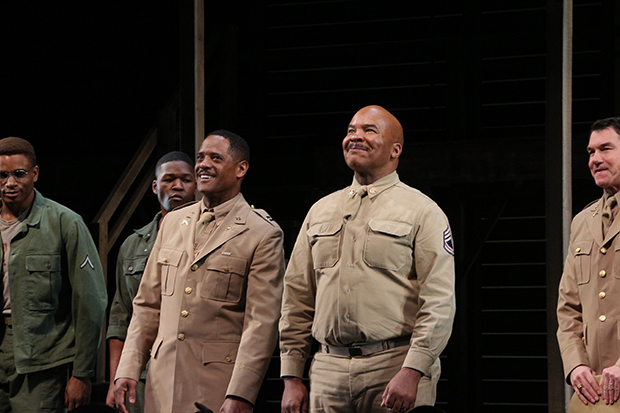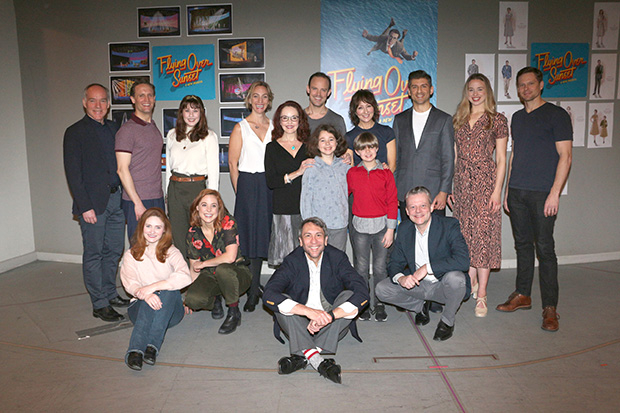"A Beautiful Ritual of Letting Go": An Oral History of the Broadway Shutdown, Part 5
Business was booming. Nearly 15 million people had seen Broadway shows during the 2018-19 season. The total box office gross was $1.8 billion. And as the calendar pages flipped to January 2020, every theater had been booked for what was expected to be a prosperous spring, with 21 productions scheduled to open between the first of the year and the late-April Tony Awards cut-off.
By Friday, March 13, that was all moot. The curtain had unceremoniously fallen the afternoon before by order of New York State, as cases of the novel coronavirus ravaged the city and rapidly filled hospitals beyond capacity. There were hundreds of different ways to have seen this eventuality coming — audiences began to thin, whole companies and other theater personnel were getting sick — but Broadway lives by one motto: The show must go on.
The September 11 terrorist attacks kept Broadway closed for a few days. Labor strikes had darkened theaters in the past, but they were generally resolved within weeks. Covid-19 has caused the longest shutdown in the history of the Broadway industry, and while there are glimmers of hope on the horizon in the form of a vaccine, there is still no definitive end in sight.
As we hit the summer of 2020, I started documenting stories from across the Broadway community in an effort to make sense of it all. This is the fifth in a multi-part oral history of the Broadway industry shutdown and its aftermath, as told by the artists making theater eight times a week. These conversations have been lightly edited for clarity and nothing else, but they all paint a picture that could be a metaphor for the world itself: we were all blissfully naive to impending disaster, until.
Read each part here as they become available every Monday.
In This Section
Kelly Devine, choreographer of Diana
Patsy Ferran, actor in Who's Afraid of Virginia Woolf?
Gaby French, actor in Hangmen
Sue Frost, producer of Come From Away
Erika Henningsen, actor in Flying Over Sunset
Tom Kitt, composer of Flying Over Sunset and The Visitor
Lorin Latarro, choreographer of The Visitor
Martyna Majok, playwright of Sanctuary City
Des McAnuff, director of Ain't Too Proud
Jim Nicola, artistic director of New York Theatre Workshop
Lynn Nottage, librettist of Intimate Apparel
Lauren Patten, actor in Jagged Little Pill
David Hyde Pierce, actor in The Visitor
Keith Michael Pinault, actor in Endlings
Scott Rollison, stage manager of Hangmen
Alexandra Silber, actor in Indecent at the Menier Chocolate Factory in London
Blair Underwood, actor in A Soldier's Play
Sharon Wheatley, actor in Come From Away
Tony Yazbeck, actor in Flying Over Sunset

(© Tricia Baron)
Introduction
Gaby French: The shutdown was going to be just for a month, until April 12.
Lynn Nottage: We were given a date of reopening on April 12, like, it's going to blow over, it's going to be one month of isolation and mask wearing, and we'll be back up and running.
Scott Rollison: Four weeks made sense. I could see it going to six. But if we were lucky, it'll be four, and we'll be back in rehearsal in three.
Sue Frost: There was a lot of triage going on. Everybody was just really shooting from the hip and I don't think anybody really had any idea how long it was going to be.
Keith Michael Pinault: We opened Endlings at New York Theater Workshop on Monday, we were dark Tuesday, we had a show Wednesday, and that was it. The company manager called us all individually to tell us that it wasn't a case of them ending the show, it was that they were essentially locking down the building for 30 days. We had an extension that was unconfirmed, but as part of the original contract, that ate up our whole run. It was one of those things we should have seen coming, but it still did blindside us.
Martyna Majok: We didn't want that to be the reality. Which is why I think it was such a shock when I got the call on the 12th that we were shutting down. I had been avoiding the news. I just wanted to live in the safety of rehearsal, and it's going so well, and it's so rare that it's going so well, as long as possible.
Lauren Patten: There was no part of my mind that could have conceivably thought that we'd be shut down for a month. Now it feels hilarious that I thought it would only be a month.
Des McAnuff: Even though I knew that we wouldn't be coming back to work in a couple of weeks, I didn't expect this. I don't think that even the most pessimistic among us would have predicted that we'd still be shut down, with no opening in sight.
Lynn Nottage: We really had no idea that this was going to become our lives.
Friday, March 13, 2020
Alexandra Silber: On Friday, March 13, we did the first preview of Indecent at the Menier Chocolate Factory in London and it was packed. It was really joyful, and a real triumph of the work of that company.
Erika Henningsen: I'm not going to lie, Friday, March 13, was one of the most stressful days I've ever had in New York City. All of my friends who are in other Broadway shows have been sent home. Nobody was going anywhere. And I had a final callback for a show.
Tom Kitt: I had an interview that Friday morning at Lincoln Center with the New York Times. It was a lovely interview, but… I just thought in that moment, "I'm done." I needed to go home and take care of my family, and I had a cough.
Erika Henningsen: I called my agent [to see what I should do about the audition] and he said, "Look, I can't make the decision for you. If you feel safe, go to the audition; if you don't feel safe, don't go." At this point, in light of what's gone on, I've realized that you should have some boundaries for yourself, but at the time, I just thought, "I have to go to this." It's a part I really, really wanted, and I was really close. And then my mom is calling me saying, "Do not get on the subway!"
Tom Kitt: While I was at my interview, I got a message from The Visitor at the Public, saying that they decided to stop.
Lorin Latarro: We started the Friday at The Visitor, and Mandy Hackett from the Public came in and said that there was a staff meeting to make some decisions, but to carry on. Twenty minutes later, she came back and said we were shutting down. The Public felt the right thing to do was follow suit. We have a drum circle in the show, so we finished our day with a giant drum circle, which was pretty magical.
David Hyde Pierce: Everyone — people in the cast, people on the staff, stage management. Djembes, people banging on pots, anything. For like 15 minutes. And we were able to include one member of our cast who hadn't come in because she's living with her elderly grandmother and didn't want to risk it. We got her on a cell phone. It was the most beautiful, uplifting, amazing way to go out. It was really important.
Erika Henningsen: I remember walking into Telsey and Company and seeing that it was pretty much abandoned. I don't even remember being super present. I had to go to the bathroom to collect myself. I've been to many stressful auditions, but I've never had to ask for a second to collect my thoughts. And then I got the email that I had to go back to the theater to film Flying Over Sunset.
That was when I realized that everybody was at a different phase of understanding what this is, and the actors were caught in the middle. The actors are the ones who are still showing up to auditions, and who, of course, have to go tape their show. It was just one of those days where I thought that actors are kind of incredible, because we will put ourselves in situations that are maybe not the greatest idea, because we have a sense of community and don't want to let people down.
But it was kind of surreal — in a matter of hours, we went from "Oh, we might shut down for, like, a week, two weeks or so," to "This show is going to be filmed for an audience of 25 people because we have no idea when it's gonna see the light of day again."
Tony Yazbeck: They decided to tape it for the archives because they wanted to remember it.
Blair Underwood: We filmed A Soldier's Play for the Lincoln Center archives on Friday.
Jim Nicola: Taping Sanctuary City was very much a thrown-together thing. We weren't sure what was going to happen, but we wanted some record of what the production was.
Martyna Majok: It came together really, really quickly. I got the call at 2pm on Thursday that we were shutting down, and I went right from denial to bargaining. Can't we do one more? Can't we just invite Jesse Green to get a review [in The New York Times]? Can't we do something that makes us feel like this show existed? Now I realize, how ridiculous. That's not the point. But my mind was in such a different place than it is right now. I said, "I'm coming to that theater," like I could have a talking-to with someone.
That night — and I realize this was maybe not the smartest idea, but we were in grief — we had an opening and closing party, and when that party was done, we went to another bar. I forget who I was talking to, it might have been Caitlin Baird, the marketing person at New York Theatre Workshop, and I was like, "It would be the saddest thing if we didn't have some kind of archival copy of the show." And then it was like all systems go. We talked to [managing director] Jeremy Blocker, and within a few hours, he had a film crew — like, one guy and three cameras — all set up to record. This is at midnight or one in the morning on Friday, and by 2pm, we did the recording.

(© David Gordon)
Blair Underwood: We all could invite two people, sitting up in the mezzanine, so we'd have some reaction to play off. We had gone from four months of incredible houses to nothing. I think the ushers and people in the theater made sure to laugh extra loud or have extra loud reactions, because we'd been riding a wave for four months. I made a paradigm shift in my head and told myself we were going back to rehearsal. Just think of it as an empty house, like we did in rehearsal, and just play the moments. That last performance was just as rich, if not richer, than any show we'd ever done.
Martyna Majok: It was super loaded. It was very emotional to watch, and it looked very emotional, from where I was sitting, to perform in. Because it was such a wonderful, soul-fulfilling journey to bring it to the stage, with wonderful people all throughout, it was especially painful. But it didn't feel like a funeral. It was so joyful. It felt like a celebration of everybody's work, with hope for an unknown future.
Keith Michael Pinault: We all sat three seats apart, and it was spectacular.
Jim Nicola: On some level, it was a beautiful ritual of letting go.
Erika Henningsen: I'm really happy we taped the show and I'm really happy that our entire cast showed up for it, because it was a little bit of catharsis. I couldn't really process the idea of "I have to nail this performance," but I remember standing at the top of the staircase in this incredible wig, in this incredible costume, singing an Italian aria that Tom Kitt and Michael Korie wrote and thinking, "This is absurd that I am in this theater right now, doing this awesome thing that I love, and I think the world is crumbling outside, but I can't really focus on that part yet, I just have to go through this." Everybody was dealing with their own inner stress, but — and this is what I've always loved about theater — for three hours, I didn't have to think about anything. I remember being grateful for that. Even though it felt insane, it allowed our brains to turn off for a second and just do the show.
Tony Yazbek: I remember Harry Hadden-Paton and Carmen Cusack and I had this joke trying to make light of everything. There's a scene at the end of the first act of Flying Over Sunset where we decide to do LSD together, and as Harry's character and I meet for the first time and we shake hands, he goes, "Oh, just a second," and he pulls out a bottle of sanitizer and puts it on our hands. We had the creative team laughing, and it was recorded. I was like, "Oh, good, they'll have that on tape when we're back in like two weeks."
Tom Kitt: I was too nervous to go back on Friday night for the taping of Flying Over Sunset. I had mentally made my peace with halting myself, but I've been wondering to this day about whether I should have gone or not.
Tony Yazbeck: My birthday was the next day, Sunday, March 14, and the cast surprised me and sang "Happy Birthday." I was overwhelmed, because I was like, "I'm not coming to the theater tomorrow and these people remembered my birthday!"
Erika Henningsen: We left that evening and…it wasn't celebratory. It was kind of eerie. Like, "That was that. We have no idea what's to come of this anymore."
Martyna Majok: The truly strangest moment was when we said goodbye that night. It was like, "I'll see you at some point, maybe. I'm going to go uptown, and you're going to go to Brookyn, and who knows?" It was a very anticlimactic and sad parting.

(© David Gordon)
Saturday, March 14-Monday, March 16, 2020
Scott Rollison: Some of the Brits in our Hangmen cast were trying to stay here for the four weeks. One of them was talking about renting a car and traveling around the United States. Two days later, it was like, "No. Go home while you can." It happened very fast.
Gaby French: We packed up our stuff on the Friday and flew out on the Saturday. It all happened so quickly.
Patsy Ferran: Simon Russell Beale, who was in The Lehman Trilogy, and I have chatted about this. We thought we were going to have a four-week holiday in New York, but the more we heard, I was like, "We have to get out." The Who's Afraid of Virginia Woolf? production team was amazing, and they did everything with such calm. Within an hour of my asking, my partner and I had our tickets to fly home.
Sharon Wheatley: Rachel Tucker was new in our Come From Away cast. It was her first week. She was living in Newark and her husband and son are in London, but she thought she was going to wait it out. I called her and I said, "Listen, I don't know what to say to you, except, if it were me, and my husband and son were in London, I would get my ass on an airplane right now." I'm sure she was going to anyway, but she did. She went to the airport, got a flight, and went home.
Gaby French: We thought, "Do we stay and risk getting quarantined?" but realized that if it meant being alone in a flat in New York or going back to our family, we wanted to go home. But of course, we were all kind of hoping that we'd be flying back out. We were optimistic, but as soon as we saw how it was unfolding and getting worse, we kind of knew.
Alexandra Silber: I remember making the decision that if they close the border, I'd stay in London and do the play, because it's not like they're going to close the theater. Within 24 hours, the country shut down, and they called me and said, "You have an American passport, go home." They got me a ticket on Norwegian Airlines. I get through a ghost-town Heathrow, and a ghost-town Norwegian Air flight, and arrive to a six-and-a-half-hour customs line at JFK, where I waited like a sardine, without anyone masked around me, and which is where I definitely got the coronavirus.
Sharon Wheatley: Three or four of the six people from Come From Away who did Good Morning America the morning of the shutdown got it. We didn't. I don't know how that happened.
Lauren Patten: It's so hard to say where I got it.
Kelly Devine: I had gotten calls from a few people I know that they had tested positive. I was just a sitting duck.
To be continued on Monday, March 1










